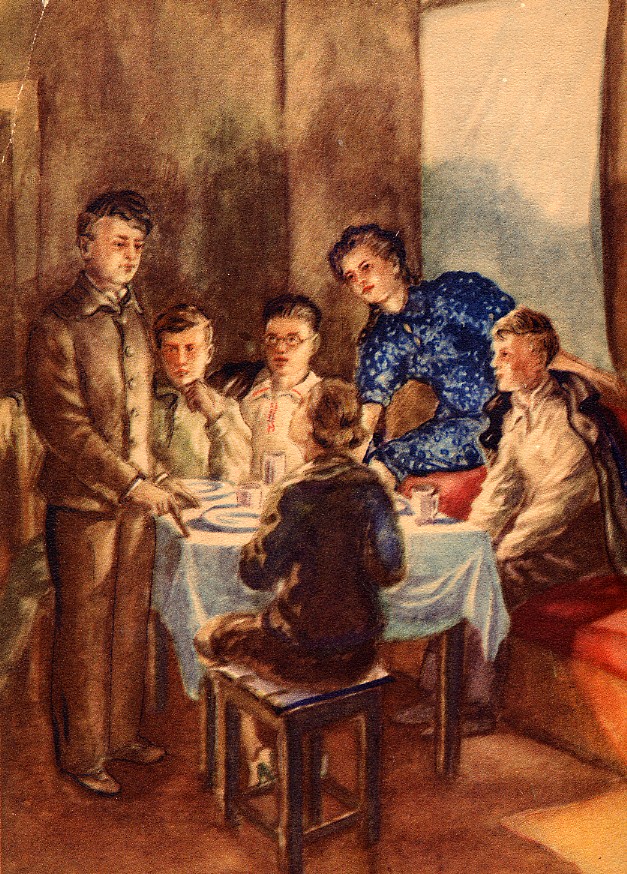
Presents a summary of:
YOUNG GUARD
Part 1
by
Aleksandr Fadeev
(1947, 1951)
A group of teenagers bravely battle the Nazis(Click here for Part 2)
in occupied Ukraine.
CHAPTER 1
It is July 1942. A group of girls--including Ulya Gromova, Valya Filatova, and Sasha Bondareva--all recent graduates of the secondary school in the central Russian mining village of Pervomaisky, are frolicking on a river bank.
The girls are disquieted as they hear bombers fly overhead and the distant sound of artillery. Following the fall of Sevastopol on 3 July, a Soviet retreat has begun. The girls all insist that if evacuation comes, they will stay behind and fight. Suddenly, explosions shake the ground.
CHAPTER 2
The girls emerge from the woods and see the road clogged with military and civilian personnel and vehicles, all evacuating. There is another explosion and the girls react with shock as they see the mines being blown up.
The girls are separated by the crowds as they hurry into the village. Ulya, trying to get to the district Komsomol committee, gets bumped into a yard where another young Komsomol girl, Lyuba Shevtsova, is standing. Lyuba tells Ulya that the Soviet troops have withdrawn from Voroshilovgrad and everyone is being evacuated. The district committee left in the morning, and Ulya should go, too. Lyuba says she was never really a Komsomoler and is going to stay.
Some workers approach, led by Andrei Valko, the director of Pit 1B, and a coal-cutter named Grigory Ilych Shevtsov, who is Lyuba's father. It was the workers themselves who blew up the mines to keep them out of German hands.
CHAPTER THREE
At the local Party and government headquarters in the center of the village, documents, equipment, etc., are loaded up to be evacuated. The majority of Party workers then bid farewell to the chosen few who are to stay behind and engage in underground, partisan work. The leader of these local partisans is to be Ivan Protsenko.
|
|
CHAPTER FOUR
Ulya hurries home. A neighbor boy and fellow Komsomol member, Anatoly Popov, has been urgently searching for her. He tells her that another boy named Viktor Petrov and Viktor's father [Petrov], who had been a partisan during the Civil War, have horses on which they can evacuate.
Ulya doesn't want to leave without Valya, her best friend. They rush to Valya's, but Valya, who is not in the Komsomol, says she is going to stay and take care of her mother. Ulya and Valya part tearfully, feeling that this parting is forever.
CHAPTER FIVE
In the confusion of the evacuation, Ulya, Anatoly, Viktor, and Petrov wind up in a column moving not east--which would have made sense--but in the direction of Kamensk, following a Soviet army division which is on its way to reinforce the Soviet defenses on the Donets steppe, south of Millerovo.
 German dive bombers attack the column of refugees. Viktor, his father, and Anatoly jump out of the cart for cover. Ulya remains in the cart. The horses take fright and gallop off wildly. A 16-year-old lad named Oleg Koshevoi, seeing Ulya's predicament, leaps on the cart and stops the horses.
German dive bombers attack the column of refugees. Viktor, his father, and Anatoly jump out of the cart for cover. Ulya remains in the cart. The horses take fright and gallop off wildly. A 16-year-old lad named Oleg Koshevoi, seeing Ulya's predicament, leaps on the cart and stops the horses.After the attack ends, Anatoly, Viktor, and Petrov run up to the cart. Anatoly and Oleg are old friends. Oleg is traveling with his aunt and uncle, Marina and Nikolai Korostylev, and their three-year-old child. Nikolai is only seven years older than Oleg and more like a brother to him than an uncle. Nikolai and Marina joke that after such a rescue there is sure to be a romance between Oleg and Ulya. While Oleg is attracted to Ulya, he feels guilty, remembering his girlfriend, Lena, who is staying behind in their town of Krasnodon.
CHAPTER SIX
Somehow Ulya's group finds itself in the midst of a group of tommy-gunners on the march. Also in the column of refugees are Valko and Shevtsov driving a mining truck, which is loaded with orphan children. An infantryman finds an abandoned collection of fitter's tools. He gives them to the miners, figuring they might make some use of them.
During the evening, gunfire can be heard ahead of the column near Kamensk. Fires also are breaking out. Ulya's group, the miners, and other refugees turn to the southeast and move across the steppe.
The sounds of fighting get louder. There is the constant noise of airplanes in dogfights.
CHAPTER 7
In the town of Krasnodon, Kovalyov, the warehouse manager of the Coal Trust, is supervising the loading up of all equipment that can be carted out and the destruction of anything that must be left behind. Nearby, Kovalyov's daughter, Klava, is talking with her sweetheart, Vanya Zemukhov. She asks him to evacuate with herself and her father. But Vanya, a 19-year-old Komsomol member, and his friend Zhora Arutyniants have been entrusted with arranging transport for young Volodya Osmukhin, who recently had an appendix operation. Klava is disappointed.
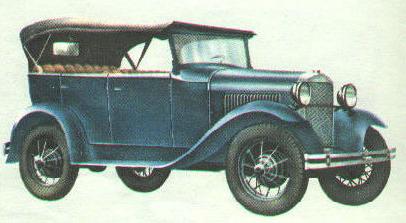 The 5-seat, four-door GAZ-A, produced between 1932 and 1936, was an almost exact copy of the American 1930 Ford-A. |
CHAPTER 8
Protsenko, who is to lead the underground operations from the forest near the Cossack village of Mityakinskaya, has final consultations with two underground workers who are to stay in Krasnodon: Filipp Petrovich Lyutikov and Matvei Shulga. After exchanging secret addresses and instructions with the two men, Protsenko departs in the Gazik with his wife, Katya.
CHAPTER 9
Shulga decides to call on Liza Osmukhin, who used to be one of his underground comrades in the Civil War days. He hasn't seen her in years. When he arrives, Liza is in a state of distress. She and her children--Lyudmila and Volodya (he of the appendix operation)--cannot evacuate because of Volodya's condition.
Liza vents angrily to Shulga about the so-called leaders, who have taken their furniture and left the ordinary people behind. Shulga scolds her, pointing out how many brave Communists are dying on the front lines right this instant. He rebukes her for her lack of faith: It's very convenient, isn't it, to lose faith in your own government just when Nazi rule is imminent.
They soon both regret their words and part amicably.
Vanya and Zhora are unable to arrange transportation for Volodya, so they come to say good-bye to him. Also present is Volodya's best friend, Tolya Orlov, nicknamed the Thunderer because of his persistent cough. Tolya announces that since Volodya is unable to leave, Tolya will stay behind with him. Everyone thinks this is very brave. Volodya vows that he and Tolya will find some way to help the underground.
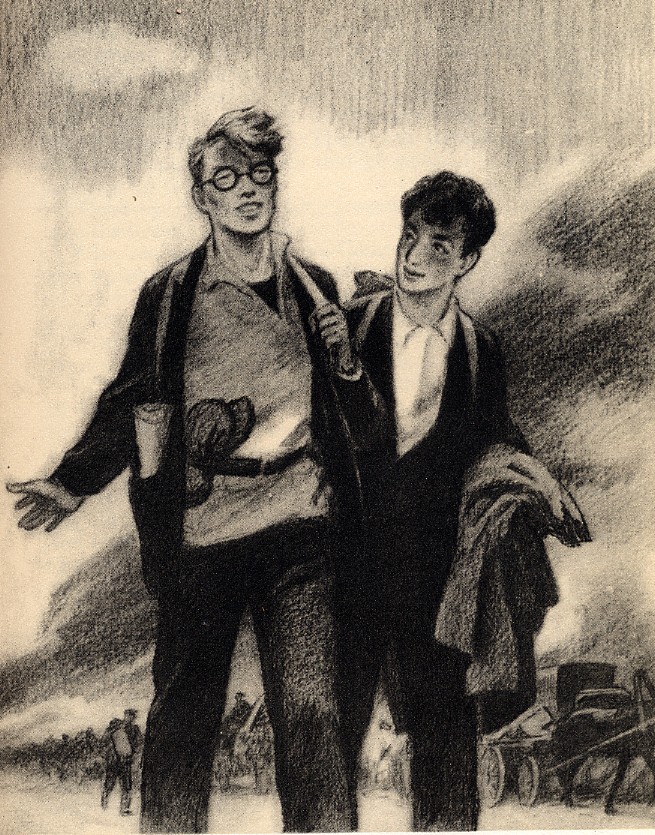 CHAPTER 10
CHAPTER 10Vanya and Zhorya leave Krasnodon and follow the railway line toward Likhaya, because that's the direction Klava and her family traveled. Along the way, they talk about possible professions. Zhora says Vanya has literary talent and should go to a literary college. Vanya says, "To try and learn to be a poet in a college is just plain nonsense. Everyone should study something and start life with some ordinary trade or profession and then, if he has a natural talent for the Muses, this it will develop of itself. I think that's the only way to become a professional writer."
After two days of marching they reach a crowded encampment. There they find Ulya's group, Oleg's group, and the miner's group, all traveling together.
CHAPTER 11
There is great confusion at the pontoon bridge crossing the Donets River. People, soldiers, trucks, and carts all struggling to get across. Suddenly, German planes bomb the area, then German artillery also comes raining down. Panic spreads. The crush of people becomes more confused. The truck Klava and her family are in almost gets shoved off the bridge and into to the water. Kovalyov's wife tells him to hurry up and run away--if the Nazi's catch him he's sure to be killed. Before departing, Kovalyov puts his family in Vanya's care, telling him to get them to Nizhniy Aleksandrovski if possible.
A bomb falls on Shevtsov's truck, killing him and the innocent children he was transporting. Ulya is dazed and confused, then shocked as she sees Nazi tanks approaching across the open steppe.
CHAPTER 12
A 17-year-old lad named Sergei Tyulenin had been sent along with a group of other Krasnodoners to dig trenches and build defenses around Voroshilovgrad. When the Nazis attacked the city, Sergei stayed on to fight, picking up the rifles of dead Red Army soldiers. Just before the Nazis overwhelmed the Soviet forces in Voroshilovgrad, on 17 July, the Red Army colonel, knowing that his forces were doomed, ordered Sergei to withdraw. Before leaving, Sergei gathered rifles, hand grenades, revolvers, and ammunition and buried them.
Sergei takes more revolvers and grenades with him and, when he returns to Krasnodon, he buries them in his back yard. He then enters his house, where his family are greatly relieved to see him alive.
CHAPTER 13
When Sergei wakes up the next morning, his best friend, Vitka Lukyanchenko, is waiting for him. Vitka had been with Sergei at Voroshilovgrad, but had left earlier at Sergei's insistence.
Vitka tells Sergei that an unknown man is hiding at Ignat Fomin's place. He also mentions that several dozen incendiary bottles, apparently forgotten, are lying in a cellar in the Senyaki district. He suggests they hide them. Sergei says they must go to the army hospital first.
CHAPTER 14
Sergei and Vitka go to the army hospital, where Sergei's sister, Nadya, works as a nurse. Sergei and Vitka volunteer to arrange to place the wounded soldiers in private houses, so that the Nazis won't get them. The army doctor, Fyodor Fydorovich agrees to the plan. He will stay on at the municipal hospital disguised as a civilian doctor.
Sergei then decides to investigate the mysterious stranger at Ivan Fomin's house. He goes to Fomin's house with a phony story about a wounded soldier he just found who needs to be hidden. Fomin nervously says he has no room. Sergei barges in and finds the mysterious stranger in a back room. At one glance, Sergei can see that this stranger is an honest and important man. The stranger [who is really Shulga] gives the flustered Sergei advice on how to take care of the "soldier".
CHAPTER 15
After Shulga had visited Liza, he went to see Ivan Kondratovich Gnatenko (known simply as Kondratovich), an old comrade of his early partisan days. Shulga expects Kondratovich to make good on a promise he made to give Shulga a place to hide out. Unexpectedly Kondratovich says he can't do it. The reason: his son and daughter-in-law can't be trusted--they're profiteering and dealing in stolen goods.
CHAPTER 16
The Nazis arrive in Krasnodon. Sergei watches their approach. Then, to his surprise, he sees 17-year-old Valya Borts, the daughter of two school teachers, sitting calmly and quietly in her garden, reading a Robert Louis Stevenson novel. Sergei jumps into the garden and talks with Valya for a bit. Then they both run off together.
CHAPTER 17
Germans enter the house of the Koshevois. Oleg's Grandma Vera and his mother, Yelena, are there. A German general--General Baron von Wentzel moves into the house. Grandma Vera and Yelena are allowed to stay on in one small side room.
German soldiers chop down the jasmine bushes and sunflowers outside the house. Grandma Vera protests, but to no avail. A similar scene is repeated at all the houses in the street. Soon there is not a bush or tree standing--leaving no cover for potential partisans.
CHAPTER 18
Germans occupy the Osmukhin house as well. Liza, Ludmila, and the sick Volodya are all crowded together in Volodya's room.
The Nazis tramp around, knocking over fences, destroying the household garden, washing themselves naked in the courtyard, stuffing themselves on the Osmukhin's food, getting drunk, singing raucous songs, urinating in public--in other words, acting like disgusting pigs. As they get drunker they invite Ludmila (who speaks some German) to come and join them. Liza locks Ludmila up in a wardrobe to keep her out of their filthy paws.
Elsewhere, the SS takes over the municipal hospital. About forty wounded Soviet soldiers had remained in the hospital. The Nazis drag them out and shoot them. A brutal SS NCO named Peter Fehnbong also shoots Dr. Fydor Fydorovich right between the eyes when he protests the inhumane treatment.
Late that night a fire burns down the Coal Trust Building, which, of course, the Nazis had occupied.
Also, in the dead of the night, Sergei creeps up to the window of Volodya's room to communicate with the Osmukhins. He tells them about the fire in the Trust Building and merely says it probably didn't start by itself.
CHAPTER 19
Earlier in the day, Sergei and Valya Borts had gone to the school and hid in the attic to spy on the German activities. They watched as the Germans occupied the Coal Trust Building and made it their headquarters. The Coal Trust building was directly across from the school, and Sergei began to formulate a plan.
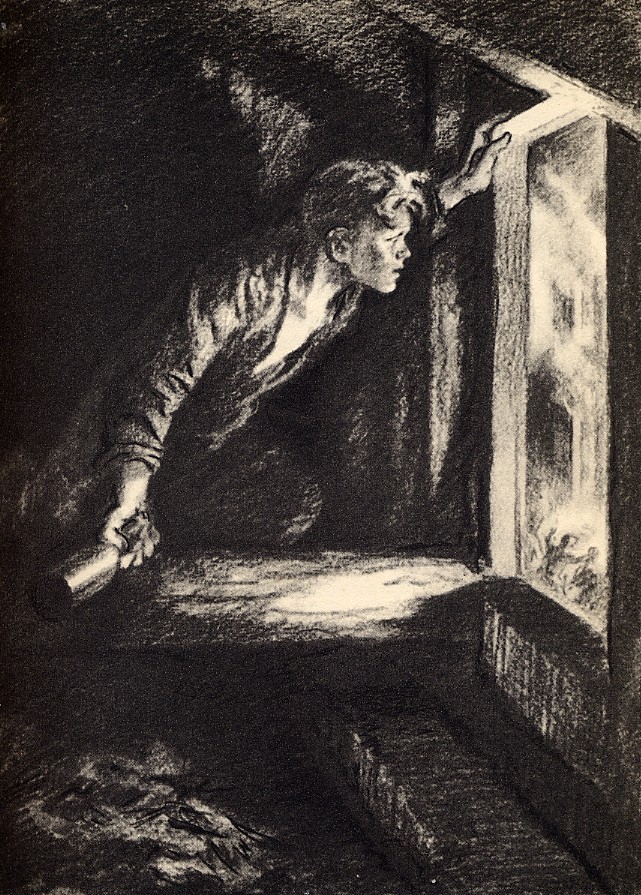 That night, Sergei unearths some of his hidden incendiary bottles and returns to the school attic. He flings the bottles into the Coal Trust Building, igniting a raging inferno.
That night, Sergei unearths some of his hidden incendiary bottles and returns to the school attic. He flings the bottles into the Coal Trust Building, igniting a raging inferno.CHAPTER 20
The General Baron von Wentzel, taking up residence in Grandma Vera's house, was a man of impeccable cleanliness, who held himself with great dignity. He would, however, belch and fart at will in the presence of Grandma Vera and Yelena.
The general and his adjutant paid absolutely no attention to Grandma Vera and Yelena, who had to deal exclusively with his batman [whom they came to call Tow Head]. Grandma Vera realized that the batman was too low-ranking to actually kill her, so she would regularly argue with him. Once, in anger, he kicked her. So she clobbered him over the head with a frying pan. The batman was enraged, but took no further retaliation.
The refugees who had not managed to get across the Donets before the Nazis destroyed the bridge now return to Krasnodon. This includes Klava, Ulya, Zhora, Vanya, Valko, Anatoly, Viktor and his father as well as Oleg and his Uncle Nikolai and Aunt Marina.
During the trip back to Krasnodon, Oleg had a private conversation with Valko, saying he wanted to work with the underground. Valko promised to keep in touch, but told Oleg to lie low in the meantime. Vanya also volunteers for underground work--after he settles Klava and her mother in Nizhny Aleksandrovka.
CHAPTER 21
The Nazis order that all Party and Komsomol members in Krasnodon register. No one shows up. Nonetheless, many are discovered and arrested.
Oleg gets into an argument with General Baron von Wentzel's batman. The batman slaps Oleg hard across the face. Oleg doesn't back down and the two tussle until Grandma Vera and Yelena separate them.
Oleg goes walking and bumps into Styopa Safonov, who takes him to see Valya Borts and Sergei. Figuring that Oleg has Party contacts, they ask him how to get in touch with the underground organization. All Oleg tells them is that the underground organization will shortly get in contact with the local Komsomolers.
|
|
Oleg and Sergei agree that they should carefully and subtly seek out contact with the underground and scope out who among their peers are to be trusted. Sergei also suggests that they try to collect any weapons that might be lying around on the steppe or after battles.
Oleg then goes to call on his girlfriend, Lena. When he gets there he is shocked by what he sees. Lena's mother is coyly accepting a gift of sardines, chocolate, and olive oil from a Nazi batman; and Lena is in the parlor, singing sweetly for some other Germans, one of whom is playing the piano. When Lena sees Oleg, she tries to cover her confusion and make sweet with him. Oleg, however, says, "What are they paying you with? Olive oil? You're selling yourself too cheap!" And he turns around and marches out.
CHAPTER 22
After the Party Committee had evacuated Krasnodon, Lyutikov remained in hiding, until finally word came that it was time for him to get to work. The message came from his contact, Polina Sokolova, a woman who goes door to door selling milk.
Lyutikov quickly dashed off a short propaganda notice to be printed up. He then took out of hiding numerous old copies of Pravda and ordered that pictures of Lenin and Stalin be taken from the newspapers and posted up next to the notices.
CHAPTER 23
A tall, thin Nazi named Herr Schweide is placed in charge of the local mining organization. He occupies a large room with four flats. Every night he entices local women into his parlor with extravagant cooking.
All workers, office staff, engnineers, and technicians of the mines and factories of the Coal Trust are ordered to return to work. Among those returning is a certain communist named Barakov. He meets with Schweider and Schweider's deputy, Herr Felder. Barakov, speaking perfect German, tells them that he is one of the few representatives of the privileged class of old Russia still alive. He claims that his father was the director of the Russian branch of a German company in tsarist times, that he loves German genius and will be proud to work for the Nazi. (This is all a lie, of course; Barakov really comes from a family of working class miners and nothing else. He's secretly working for the underground).
Barakov is made director of the workshops. This apparent switch of loyalties for Barakov surprises everyone. They are also surprised when Lyutikov shows up and takes up his old job of superintendent of the machine shops.
Lyutikov is worried when he learns that Shulga has disappeared.
CHAPTER 24
Volodya is recovered from his operation. Lyutikov calls on him and asks him to return to work in the machine shops. (Volodya had dropped out of the tenth grade and been working as a fitter since his father had died in the first year of the war.)
Volodya says he wants to fight the Germans and that he will return to work only if it masks his true intentions. Lyutikov tells Volodya to be more careful of what he says in public--these days you never know whom to trust. He then lets Volodya know that he--Lyutikov--is working for the underground and that the underground could use a youth organization attached to it.
Lyutikov gives Volodya an assignment. Before the Germans came, the Party organization buried newspaper type in the park. Volodya is to ascertain if it would be possible to dig up and retrieve that type without the Germans' knowledge.
Lyutikov also authorizes Volodya to contact his friends Tolya, Zhora, and Vanya and see if they can be counted on. Lyutikov gives Volodya one final admonishment: Never take action on his own; always consult first with Lyutikov or other members of the organization.
CHAPTER 25
Volodya meets with Tolya, Zhora, and Vanya to explain the new situation--without naming Lyutikov, of course. Vanya says that Volodya should check with his contact about the possibility of including Oleg in the group, explaining that Oleg is in contact with Valko and that Valko is trying to get in contact with the underground.
|
|
At night, Vanya, Zhora, and Volodya creep over to Oleg and tell him of their underground contact and of their assignment to retrieve the buried type from the park. They decide that tomorrow they will check out the park, noting the placement of anti-aircraft guns, shelters, trucks, etc.
Oleg's Uncle Nikolai overhears Oleg's nighttime conspiracy session. In the morning, he tells Oleg that he has a wireless set hidden under the floor.
Two girls come to call on Oleg--a Nina Ivantsov and Lyuba Shevtsova, who has secretly been trained as a wireless operator.
CHAPTER 26
The night Valko arrived in town, he snuck over to the Shevtsovs' house. He told Lyuba and her mother the sad news about how her father died when the Nazis bombed the truck load of refugee children.
Guessing the secret that Lyuba is in contact with the underground, Valko says that he wants to be of use to the cause and asks that she put him in touch with Kondratovich.
Valko spends the night in the abandoned barn of Lyuba's neighbors.
That night, Nina and her sister Olga come to call on Lyuba along with Sergei Levashov, who studied with Lyuba at the wireless operators school. While at the school, Levashov had been sweet on Lyuba, but she was a little put out by his shy, reticent behavior.
CHAPTER 27
Nina and Olga--who had been doing underground work in Stalino with Levashov--ask Lyuba if there are any Germans in their house. Lyuba tells them it's all clear, so they leave. Lyuba lets Levashov clean up and brings him some food. He tells her of the horrors of his work in Stalino, where the Germans were rounding up and killing people by the thousands. The pit shafts were piled high with bodies. Levashov himself just narrowly escaped capture.
The next day, Lyuba arranges a meeting between Kondratovich and Valko. Kondratovich tells Valko about his meeting with Shulga, but, of course, he doesn't know where Shulga has gone. Valko tells Kondratovich to return to work.
Oleg and Nina scout out the park. The Germans have put an observation post on the nearby school, which will make it impossible to get at the buried type. In the course of conversation, Oleg tells Nina about his co-conspirators and about Ignat Fomin's betrayal of an unknown member of the underground.
Nina brings Oleg home. She tells Olga everything she learned from Oleg. Olga then goes to report it all to Valko.
When Olga returns, she, Nina, Oleg, and Nina's mother, Varvara Dmitrievna, play cards. They all have great fun. When it's time to leave, Oleg asks Nina if he can kiss her on the cheek. Flustered, she says there's no time, because Oleg has to get home before curfew.
Approaching his home, Oleg is intercepted by his Uncle Nikolai. He warns Oleg that the batman (whom they call Tow Head) is on the warpath, looking for Oleg. They go to lay low at the house of Viktor Bystrinov, a friend and colleague of Nikolai. Viktor gives them the news that Statsenko, the chief of the planning department of the Kasnodon Coal Trust, has been made Burgomeister by the Germans. This is surprising, because everyone thought that Statsenko was an okay guy.
CHAPTER 28
Statsenko had had a normal, average career, receiving promotions at a slow and steady pace. He was a reliable worker and seemingly friendly with everyone. Secretly, however, Statsenko always longed for a pleasant life without having to expend any labor, energy, or knowledge. He was always jealous of anyone with foreign goods. He praised foreign films even though he had never seen any. He adored foreign fashion magazines which contained pictures of women in elegant attire or in almost none at all.
When the Germans came to Krasnodon, Statsenko went to the police station to volunteer his services. There he saw both Ignat Fomin and Shurka Reiband, a dispatcher from the bread factory and a descendant of German immigrants. Both Fomin and Reiband are working for the Germans.
Statsenko is immediately named Burgomeister and rewarded with a cigarette and a few squares of chocolate.
Ignat Fomin was originally from the Voronezh region, where he was a wealthy peasant. When the Revolution came, he pretended to support it. He denounced his brothers and succeeded in getting them prosecuted and exiled. This allowed him to take possession of their property. When collectivization began in 1930, Fomin's possessions were confiscated and he was sentenced to exile in the north. However, before sentence was carried out, Fomin murdered the chairman of the village Soviet and the secretary of the village Party committee.
Fomin and his wife fled and managed to get forged documents in the name of Ignat Fomin. They came to the Donbass and passed themselves off as normal, hard-working Soviet citizens.
Fomin, of course, welcomed the Germans when they arrived in Krasnodon. He betrayed Matvei Shulga, who now lies beaten and bloody in a Nazi cell.
|
|
Protsenko has been fighting with his partisan detachment along the Donets River and on the steppe. He decides he must break his partisans into smaller units and work out of their base in the Mityakinskaya Forest.
Protsenko, his wife, Katya, and his deputy, Kornei Tikhonovich Narezhny, break out of German encirclement. They sneak into an occupied village and find shelter with a peasant woman named Marfa. Her husband is fighting on the front. She urges Protsenko to tell all the troops to fight on.
CHAPTER 30
Oleg meets with Lyutikov to revceive instructions. Later, a young fellow named Evgeny Stakhovich, who until recently had been fighting with Protsenko's partisans, returns to Krasnodon. (Exactly how he got separated from the partisans is somewhat of a mystery.) He calls on his old friend, Volodya, who brings him up to date on what's happening in town (only as far as underground secrecy will allow, of course.) Stakhovich claims that he has been sent by the partisans to organize underground activity.
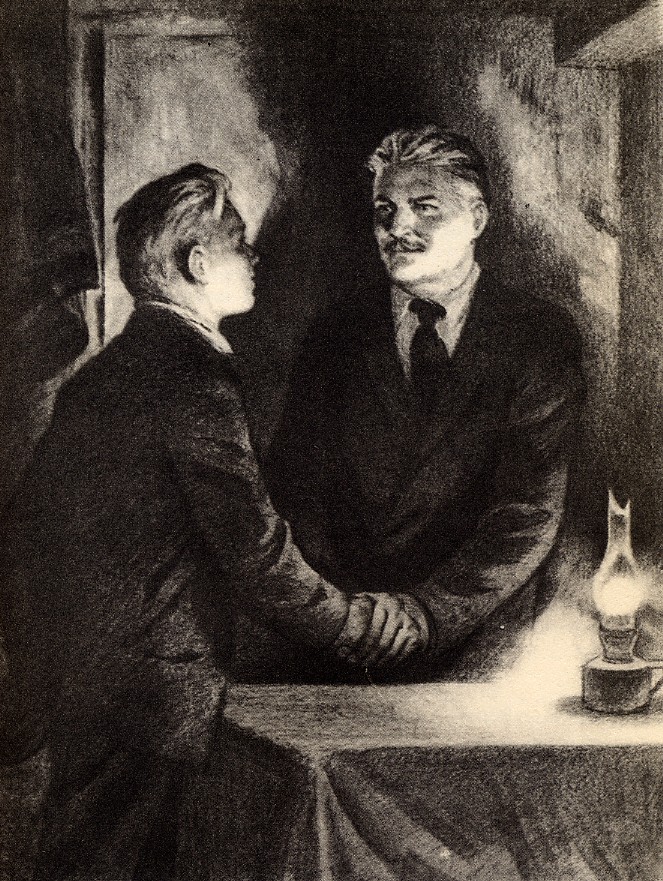 Valya Borts and some other youths go out onto the steppe as if just strolling, but really to pick up any lost or discarded weapons which they can find lying about and then hide them.
Valya Borts and some other youths go out onto the steppe as if just strolling, but really to pick up any lost or discarded weapons which they can find lying about and then hide them.When Valya returns home she finds out that a young fellow named Vanya Turkenich has shown up in town and is looking for her. The last Valya had heard of Turkenich, he was in Stalingrad receiving training on anti-tank guns.
Lilya Ivanikhina, a surgeon's assistant who had been reported killed at the front, returns to Pervomaisky, looking very thin. It turns out that she had been in a Nazi prison camp. But she and other women had murdered the matron in charge of them and escaped. Lilya walked by foot all across Poland and Ukraine to get home. The local girls have a joyous get-together to celebrate Lilya's return. They sing songs. Ulya recites Lermontov's The Demon, which so moves Lilya that she bursts into tears.
CHAPTER 31
Nina tells Ulya and Anatoly to contact the Pervomaisky youth who they think will be good for underground work. As they compose their list of candidates, Ulya leaves out Valya Filatova, who, Ulya thinks, doesn't have enough strength.
Valya Filatova had no intention of registering to work for the Nazis, as everyone was ordered to do. But her resolve wavered and she went to do just that. They crudely demanded that she strip naked for a physical examination. She was declared fit and told that she would be shipped to work in Germany.
In despair, Valya Filatova goes crying to Ulya. Ulya is disgusted by Valya's wailing and self-pity. She says she'll help find a place for Valya to hide. But Valya, afraid of what the Nazis will do to her mother if she flees, refuses.
Later that night, Viktor and Anatoly come to tell Ulya that Viktor's father [Petrov] has been beaten and arrested by the Nazis.
CHAPTER 32
In prison, Shulga is interrogated and beaten daily, but he doesn't give up the names of his comrades. Vasya Pirozhok and Anatoly Kovalyov are two Soviet youth who are working for the Nazi police. But they're really spies for the Soviet underground. One day, Pirozhok comes to Shulga's cell. He quickly whispers to Shulga that friends are working on a way to help him escape.
Shulga is taken for interrogation again. But this time, instead of beating him, they bring in Petrov [Viktor's father] and beat him. Despite the beating, Petrov and Shulga pretend not to know one another.
Shortly thereafter another prisoner is tossed into the cell with Shulga. It is Valko.
CHAPTER 33
Ivan Turkenich had served as a lieutenant at the front. He was captured by the Nazis, shot, and left for dead. He survived, however, and managed to return to Krasnodon Now he could serve as a genuine military leader for the underground youth.
Barakov and Lyutikov entrust Turkenich with organizing an attempt to bust Shulga out of prison. To this end end, Turkenich meets with Vanya, Sergei, Lyuba, and Stakhovich. Ulya is also brought into the group.
Then comes the news that Petrov, Valko, and every other Party member, Soviet administrator, teacher and social worker who had not managed to evacuate have been arrested. This was just part of a general round-up by the Nazis. Pirozhok and Anatoly Kovalyov are also arrested, but the reason for that is unclear.
|
|
Just then, Pirozhok arrives, beaten and bloodied. It turns out that Pirozhok and Kovalyov were supposed to take part in the mass arrests. But they just couldn't bear to do it, so they got drunk as an excuse not to go. The Nazis came for them, beat them up, and kicked them out of the police.
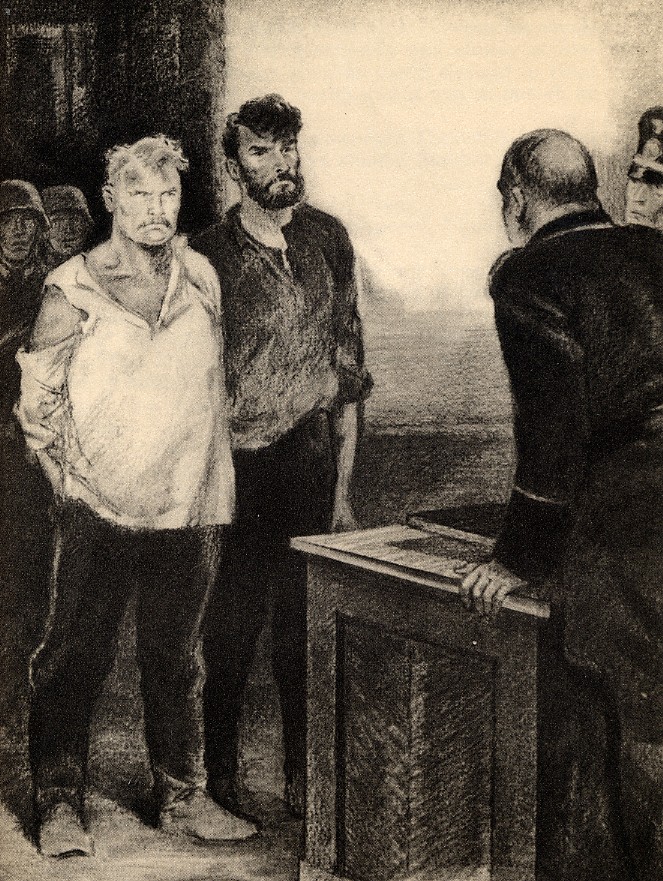 CHAPTER 34
CHAPTER 34Valko and Shulga are brought before a Nazi commander named Bruckner. Bruckner offers Valko a cigar and a deal: He will release Valko and make him chief engineer of the local coal operation if he reveals the names and all details of his underground organization. Valko claims that he knows of no such organization.
Bruckner angrily shoves the cigar in Valko's face. Valko punches Bruckner, and all hell breaks loose. Valko and Shulga put up a great fight, but they are eventually overpowered and beaten into unconsciousness.
When they come to in their cell, Valko and Shulga realize that they will soon be executed. The spend the time proudly reminiscing about the difficulties endured by the brave Soviet people and the achievements won by Soviet power since 1917.
CHAPTER 34
The brutal SS NCO Peter Fehnbong keeps a belt wrapped around his body underneath his uniform. He wants to keep it secret, so he almost never changes clothes or washes. As a result, he usually gives off an awful stench.
|
Young Guard: 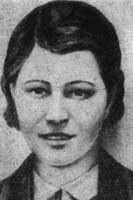 The novel "Young Guard" is based on real people and real events. View photos, read histories and other documents concerning them at: Molodaya Gvardiya |
In the middle of the night, all the prisoners, including Valko, Shulga, and a mother with an infant in her arms, are marched out to the park and forced to jump into a large, freshly dug pit. Shulga shouts out:
My magnificent comrades! Eternal remembrance and glory be yours! Long live the Communist Party, which has shown the people the road to justice!As the prisoners are buried alive, they bravely sing out the Internationale. The singing is heard by Valya Borts and her mother, Maria, as they help her father sneak out of town.
In-text illustrations by V. Shcheglov
